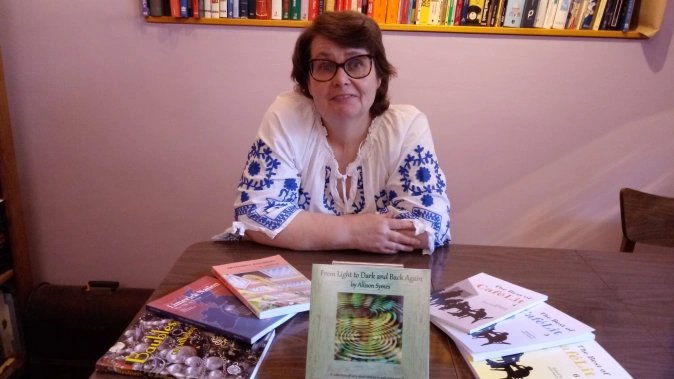Facebook – General – and Chandler’s Ford Today
In my CFT post Controlling the Weather I share a flash fiction story of mine which is shorter than Edward Bulwer-Lytton’s “it was a dark and stormy night”. Do see the post for the full sentence (and take a deep breath before you start too!).
I now know why Snoopy only ever quotes “it was a dark and stormy night” but no more as there wouldn’t be enough room in the caption bubble!
I rarely use the weather in flash fiction as the word count means I have to show you the pertinent detail(s) about the characters. The weather rarely comes into that!
So what would count as pertinent details then? For me these are:-
1. Something of their attitude/outlook on life (I show this via internal thought as well as dialogue).
2. Something of their setting. Setting can change the outcome of the story or have a huge influence on it, for good or bad.
3. Sometimes a brief physical description where it matters to the story. In my Pen Portrait I show Mary as a character who brushes her hair once a day whether she needed it or not. I mention her clothes and shoes would see her through a battlefield but DON’T specify what they are. I don’t think I need to do so either. Those two lines should conjure up an image of Mary well enough! It also shows something of her attitude (double whammy here!).
I’d say 1 is the most important and “where it matters to the story” is THE golden rule of fiction writing, regardless of whether you write flash stories or longer works.
Image Credit: The magnificient Pixabay. Captions via the CFT post! Also this post was shared on From Light to Dark and Back Again as well as I thought the pertinent details relevant to that page too!
Managed to catch up with a couple of writing prompt exercises, both of which will become flash fiction stories later. Complete contrast in moods for the exercises too but I like that. It keeps me on my toes, which of course is the idea behind said prompts.
I tend to write up these prompts in batches but that’s fine. It’s a little like not being able to stop at one crisp or what have you once you get started on them!
The nice thing about free writing like this is I know the stories aren’t perfect but that doesn’t matter at this stage. I’ve now got two more stories to work on for submission somewhere in due course and that’s great.
My CFT post this week will be looking at Controlling the Weather. You can tell my other writing hat is fantasy, yes?!
I look at why controlling the weather isn’t a good idea, even if we could do it.
Also I discuss why “it was a dark and stormy night” has gone down as one of the most renowned writing cliches. (Possibly to only be beaten by “and it was all a dream”? Thoughts on that would be welcome when the link goes up on Friday).
I have to say I’ve written flash fiction stories shorter than that infamous opening line from Bulwer-Lytton and I go on to prove it in this post too! And if could control the weather for a day, what would you ask for and why? Thinking heads on in time for Friday’s post then (and those of you of a certain age will remember where that phrase comes from! Clue to those who are not: a former Doctor Who plays a scarecrow, yes really!).
PS Looks like no photos will upload tonight so apologies. Believe this is a FB issue. Hopefully normal service (and photos) will resume soon… (NB From Wednesday, 3rd July when FB and What’s App seemed to have an issue with photos. Glad it appears to have been resolved).
Facebook – From Light to Dark and Back Again
Occasionally a story idea proves to be a better match for a standard length short story (1500 words or so) than flash fiction, which is fine. I find a suitable competition/market for that longer story and don’t try to keep it sub1000. (How do I know incidentally? It is always the character’s voice and sometimes they have more to say than I originally thought they would!).
I sometimes deliberately make myself write longer stories as the discipline of working to very small word counts AND what would be considered an industry standard is very good for you as a writer. Shaping what I’ve written to fit the most appropriate market/competition is something that will always be needed and is a useful skill to develop.
Looks like the photos will be unavailable for a bit though I understand this is a FB/What’s App issue. Hope it’s resolved soon. Don’t envy those trying to sort it out.
Meanwhile back to good old text only.
In researching my CFT post this week about Controlling the Weather (yes, really – more on Friday when the link goes up), I looked at a very famous opening line that has gone down in the annals of Cliche and Purple Prose, so much so even Snoopy quotes it regularly.
To my surprise, I found I’ve written flash fiction stories which come in at under the word count of that opening line!
So every word counts then in a flash story? Of course but the words have all got to pull their weight. You know when the story’s right (or as much as it can ever be) when you can’t change anything or remove a word without it spoiling the story somehow. One lovely thing about flash is you know you haven’t got the room for purple prose which is a huge encouragement not to write it at all!
Fairytales with Bite – Controlling the Weather and What Writers Should Control
My CFT post looks at why Controlling the Weather isn’t a good idea even if we could do it. I also look at why “it was a dark and stormy night” has gone down as one of the all time “great” writing cliches. But can the weather play a purpose in writing? Can writers control their use of it so it is effective, rather than something that can be mocked (as that infamous opening line so often is)? What should writers control in their writing?
The weather can play a role in writing as long as it matters to the story (in terms of outcome/character development etc). Generally speaking, it matters to the story is the most important rule in all fiction writing! Weather can also be used to reflect or contrast mood. If someone is singing in the rain, we would generally want to know why! Interest piqued… now follow through with interesting reasons why!
What writers should seek to control in their writing should be:-
1. Everything that is in the story has to be in there. Something would be lost in terms of character and/or plot if anything was removed. If anything could be skipped, cut it out. It is what readers/editors will skip.
2. Their characters. Characters should be well developed and should engage with the reader (even if it is to make the reader hate them!).
3. Dialogue. This should reveal information/move the story onwards. Any dialogue without a purpose shouldn’t be in there.
This World and Others –
When You Know Your World Works
There are certain pointers which will indicate your created world is working and hopefully will encourage you to develop it further.
1. You know how the world is run. (There has to be some sort of government).
2. You know who are the powerful and who are the downtrodden (some things are just universal!).
3. You know the immediate setting for your story intimately. You need to be able to portray this, almost as if it were a character in its own right.
4. You know where your characters fit into your world (and whether they fit in well or not. Do they defy convention or follow it religiously?).
5. You have some idea of how your people survive in terms of food/water/sanitation/employment provision. I can’t think of any created world where characters don’t have to eat, be able to resource themselves etc.
Not all of these details need to make it into your story. We don’t need to know everything about politics in your world but we do need to know what matters to the story (which I think is going to be a new mantra for me but it is a useful one!).
Other News including Publication News
Am delighted to say my story What Goes Around will be in Bridge House Publishing’s Nativity anthology later this year. What with The Art Critic and Dignity and Injustice due to be published in The Best of Cafelit 8 in December, I will have three stories in two books then! I am also still thrilled of course that The Professional was in the ebook Transforming Being, the Bridge House published ebook of the winning entries for the Waterloo Arts Festival Writing Competition.
I have also set up an Amazon Authors Central page and these are set for the US, UK, France, Germany, and Japan. Here you can find out more about the anthologies my stories have appeared in as well as about From Light to Dark and Back Again of course.
It has been a good month!




















